Published on: March 12, 2024
AI for Business Book: A Comprehensive Guide for Non-Tech Business Leaders
Author: Amy Lancelotte

Consider a future where AI is your business partner, drawing insights, predicting trends, and automating processes much like a trusted advisor.
A tall order, perhaps? Yet, every day, more firms are harnessing artificial intelligence to propel themselves into this business utopia. From Starbucks using AI to predict your next cappuccino craving to Amazon’s Alexa spearheading the Voice-First revolution, AI’s footprint is expanding at an exponential pace. Here’s a think-piece to chew on – daily, we produce data equivalent to over 530,000 Libraries of Congress – and AI is the key to convincingly ‘digesting’ such colossal flows of information, unlocking potential that has previously been untapped.
This, then, is the era of AI-driven business strategies and AI-powered business intelligence, and your front-row ticket is right here. This comprehensive guide is tailored for you, the non-tech business leader, to ride the crest of this AI wave, sans the befuddling tech jargon.
Understanding AI implementation in business: A comprehensive guide
- Recognize the rising tide of AI in the business sphere.
- Identify sections in your company ready for AI improvement.
- Get familiar with AI fundamentals and different forms.
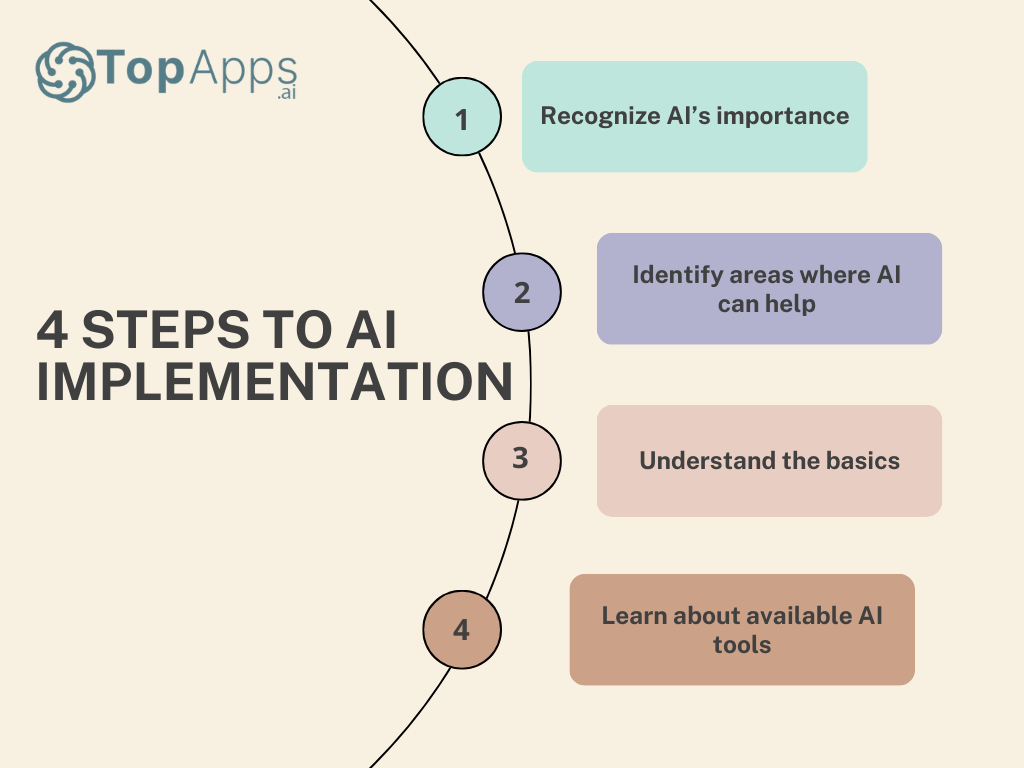
Step 1: Recognizing the importance of AI in today’s business landscape
Artificial intelligence is no longer a concept of fiction; it has become a significant component of modern enterprises. Home to operations across various verticals, AI’s versatility offers once unthinkable solutions. AI’s impact on businesses is revolutionary. From efficiency improvements and cost reductions to a total paradigm shift in how tasks are undertaken, it’s all happening. Severe competition makes it an essential step for business leaders to explore and adapt to AI.
The importance of AI in today’s business landscape cannot be overstated. For example, AI-powered chatbots are reshaping customer service experiences and conversational UIs. Using machine learning, these bots can learn from previous conversations and progressively become better at assisting customers. AI breaks open the ability to analyze large data sets swiftly and accurately, pulling out essential insights that may have been missed by human eyes. This gives businesses a competitive edge by allowing them to make data-driven decisions based on patterns and predictions provided by AI algorithms.
Step 2: Identifying areas in your business where AI can be implemented
AI’s varied applications mean it can be integrated into nearly any business context – from human resources to marketing, customer service, and even product development. The trick is to pinpoint where its implementation could reap the most benefits.
Identifying the areas that could most benefit from AI requires an in-depth understanding of your business processes and the challenges they face. For some, customer service might be the area most in need of improvement, while others might benefit more from AI’s data science capabilities for analyzing large data sets. The point is that every single element of your enterprise can potentially be improved by implementing AI solutions.
A crucial point to note is that AI isn’t a one-size-fits-all solution. Rather, its application should be customized to the specific needs of your business. Only then can you truly tap into its transformative potential.
Step 3: Understanding the basics of AI and its various forms
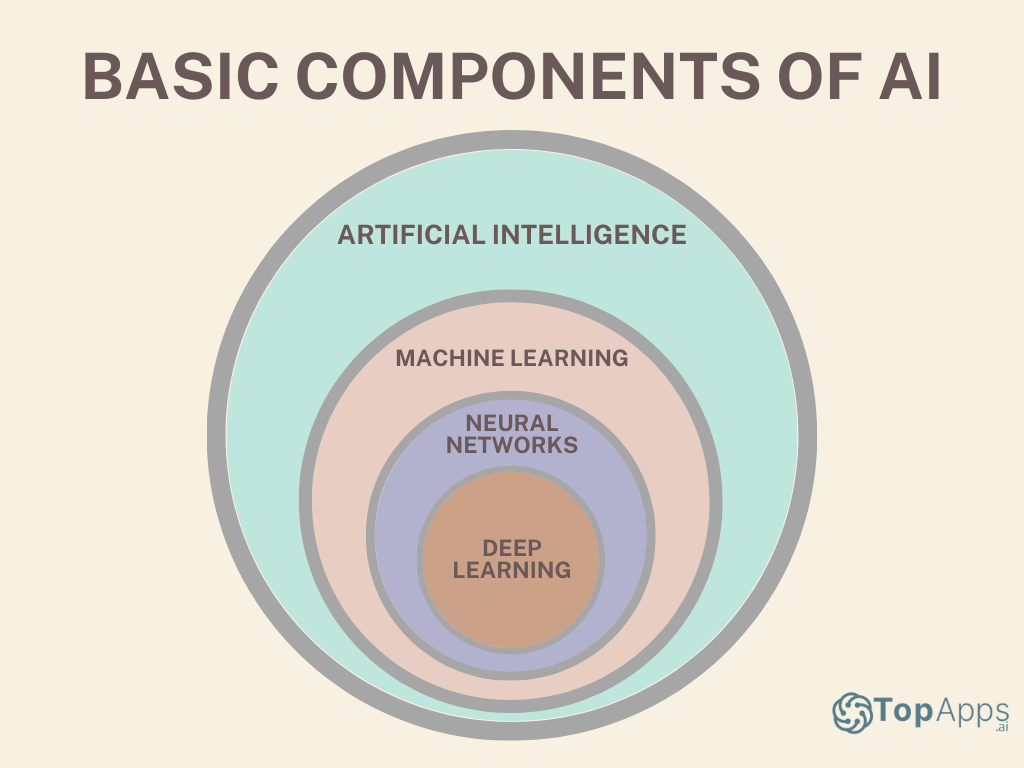
Deep diving into AI can be quite the task, considering it spans several disciplines. It’s a branch of computer science and covers machine learning technologies to natural language processing (NLP), including neural networks, and computer vision. Consequently, grasping the basics of AI and its various forms is paramount to its effective application in business.
The diversity of AI is what makes it a game-changer in virtually every facet of business. Machine learning, for example, enables computers to learn from data and improve over time. Neural networks mimic human brain systems, and NLP allows computers to understand and respond to human language. Computer vision services are how AI can extract information for things like images or complex documents. Deep learning, goes even further. Here’s how IBM defines it:
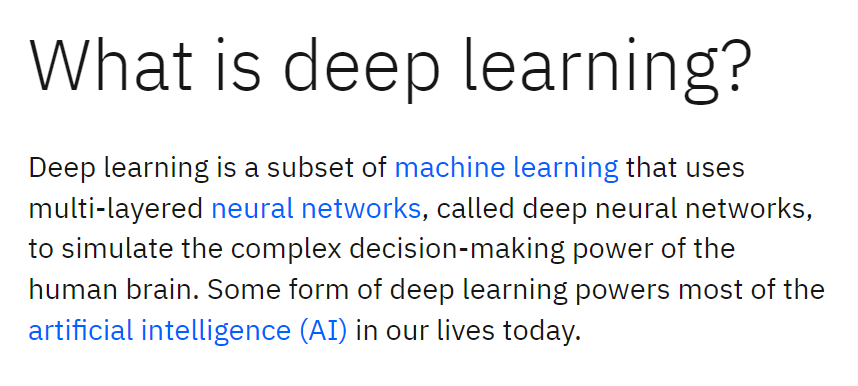
Understanding these basics isn’t about becoming a tech wizard overnight. Instead, it is about understanding the possibilities these technologies bring and how they could redefine your business operations.
Step 4: Learning about AI tools and platforms suitable for business
The final step entails acquainting yourself with the many AI tools and platforms available in the market. Remember, deploying the right tool could make the difference between successful AI implementation and failure.
Some AI tools, for instance, are deliberately designed for business analytics. Others offer industry-specific solutions, like AI tools for healthcare that handle tasks such as data management and predictive analysis.
To determine which tool to use, consider your business needs, budget, and the tool’s compatibility with your current systems. Ultimately, your chosen AI tool should augment your business operations and contribute to better results.
Thorough research into the tools and platforms that could cater to your business needs would secure the success of your AI implementation and set the stage for your future efforts in AI technology.
Mastering AI business strategies: A roadmap for success
- Benefits of integrating AI in formulating business strategies.
- The role played by AI in enhancing decision-making processes.
- Illustrative case studies depicting the success of real-world businesses leveraging AI.
The role of AI in formulating business strategies
Artificial intelligence for business aids in crafting effective strategies, thanks to its advanced data analytics capabilities. AI tools analyze massive data volumes to extract deep insights, which are invaluable for targeting business decisions effectively. They can forecast trends, spot patterns, and unveil opportunities, enabling strategy formulation that’s data-driven and highly accurate.
AI’s machine learning aspect provides businesses with predictive profiling. Thus, businesses can comprehend consumer behavior in-depth, empowering them to devise user-specific strategies, and setting the stage for personalized marketing.
According to a 2023 study by Oracle, up to 70% of business leaders would prefer that AI make decisions for them and a whopping 97% are happy to leverage the data provided by AI to guide their business decisions. There’s no escaping AI’s influence on the business world!

How AI can enhance decision-making processes
AI’s potential to amplify decision-making processes is immense. Primarily, it can streamline data interpretation. As businesses generate massive amounts of data daily, comprehending the information is a mammoth task for data scientists and business analysts. AI alleviates this issue by swiftly interpreting complex data sets, empowering executives to make informed decisions.
Moreover, AI’s predictive capabilities can inform future business decisions. AI models can analyze past trends, draw parallels with current data, and predict future patterns. Thus, businesses can proactively address future challenges, staying ahead of the curve.
Also, AI has started taking over routine decisions. Its algorithms can handle recurring, data-heavy decisions, freeing executives to focus on strategic planning.
But, we should proceed with a little caution according to the Harvard Business Review. We should lean on AI’s prediction powers to generate new, necessary data from data we already have. AI isn’t infallible, and trusting it blindly isn’t a good idea. As a result, AI technologies are best used in conjunction with human intervention, especially when making high-level decisions.
Case studies: Successful AI strategies in real-world businesses
Starbucks
Starbucks is a great example of an enterprise leveraging AI effectively. The company uses AI to craft personalized marketing content based on individual customer behaviors, driving user engagement and satisfaction levels. Additionally, under the umbrella of something aptly named Deep Brew, Starbucks is working to develop even more AI tools that will completely revolutionize the customer experience
From its search algorithms to self-driving cars, Google’s application of AI is diverse. But a standout instance is Google’s use of AI to optimize cooling in data centers, immensely reducing energy consumption.
American Express
American Express utilizes AI to detect fraudulent transactions in real time, enhancing security for its millions of users. It also uses AI technology to make personalized recommendations to its new and existing customers. They have expanded the use of AI by acquiring companies like 30SecondsToFly and Egencia.
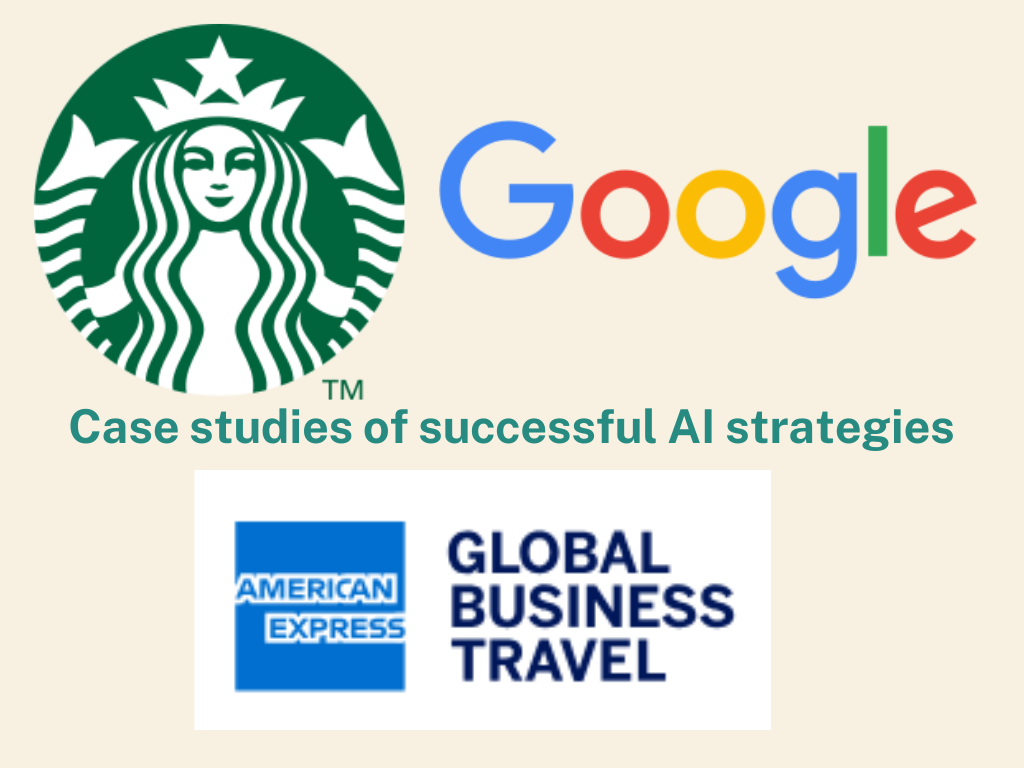
AI for non-tech leaders: Simplifying the complex
- De-mystify AI jargon—understand the essential terms.
- Learn steps to introduce AI within your organization, even without a tech background.
- Discover the best resources for continuous AI learning—your hand-picked guides, books, and courses.
Breaking down AI jargon: A glossary for non-tech leaders
Artificial Intelligence, or AI, can often sound like a foreign language, especially to non-technical leaders. To have meaningful conversations about AI, you have to grasp its unique jargon. A comprehensive glossary will guide you through common AI terminology, from machine learning to natural language processing.
Without getting lost in technicalities, remember the main goal here: empowering you to embrace AI-related discussions confidently. To make it manageable, you might want to focus only on the most frequently used terms in your industry.
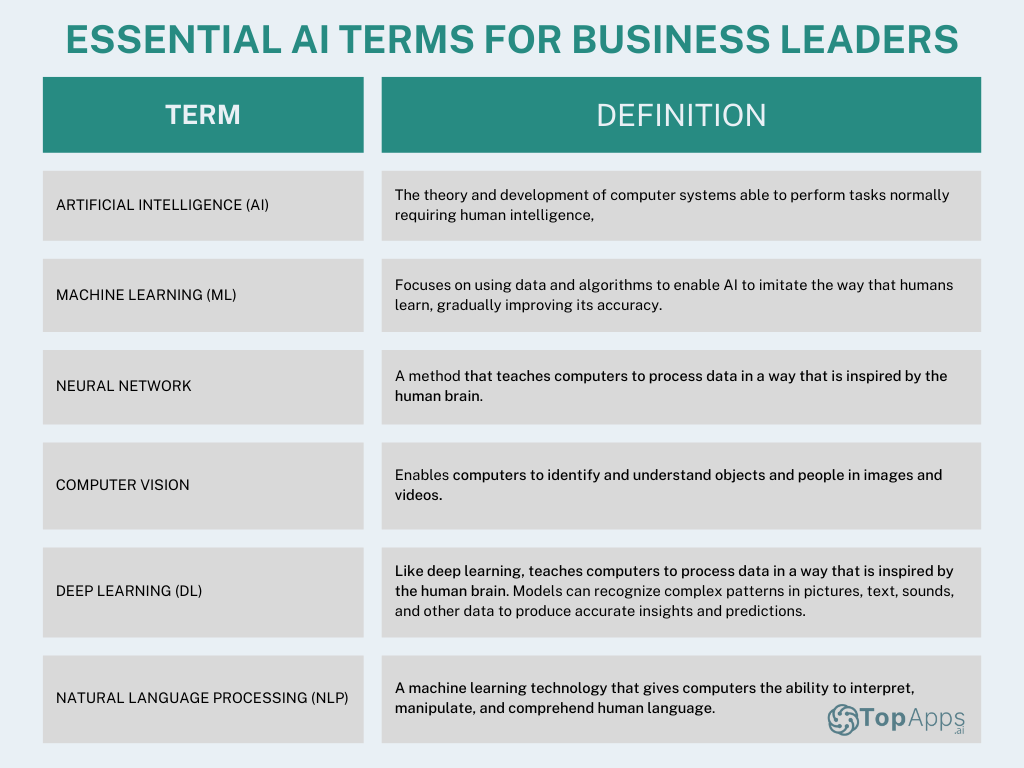
How non-tech leaders can drive AI initiatives in their organizations
You don’t need a coding degree to lead AI initiatives. While understanding how algorithms work could be helpful, it’s your strategic outlook that guides the AI implementation in your organization.
Before anything else, it’s crucial to delineate how AI can add value to your business— from automating tedious tasks to gaining unprecedented insights.
The next step is to assemble a team capable of transforming these AI aspirations into reality. You might want to hire new staff or train your current team—depending on the scale of your AI ambitions. Here are some things to consider:
- Skill diversity: Look for a mix of skills that complement each other, including data engineering, machine learning, research, software engineering, and domain-specific knowledge. Diversity in technical skills ensures the team can handle the full scope of AI projects from data preprocessing to model development and deployment.
- Experience level: Balance the team with a mix of junior, mid-level, and senior professionals. Experienced members bring depth of knowledge and leadership, while junior members bring fresh perspectives and energy.
- Problem-solving skills: Look for individuals who are not just technically proficient but also excel in problem-solving. The nature of AI projects often involves navigating uncertainty.
- Continuous learning: Given the rapid pace of AI advancements, it’s crucial to have team members who are committed to continuous learning and staying up-to-date with the latest technologies and methodologies.
- Communication skills: The ability to clearly communicate complex ideas to non-technical stakeholders is invaluable. This includes writing skills for documentation, presentation skills for sharing findings, and interpersonal skills for collaborative work.
- Ethical considerations: As AI has significant ethical implications, it’s important to have team members who understand and prioritize ethical considerations in AI development, including fairness, privacy, and transparency.
- Industry knowledge: Especially for domain-specific projects, having team members with relevant industry knowledge can be a significant advantage.
Resources for further learning: Books, courses, and more
Even if you’re not a tech enthusiast, AI is an area well worth your attention. From books written specifically for business leaders to Massive Open Online Courses (MOOCs) covering fundamental AI concepts— there’s a wealth of resources out there to continue your AI journey.
Books
- “AI Superpowers: China, Silicon Valley, and the New World Order” by Kai-Fu Lee – Offers insights into the global AI race and its implications for economies, businesses, and geopolitics, written by a veteran of the technology industry.
- “Human + Machine: Reimagining Work in the Age of AI” by Paul R. Daugherty and H. James Wilson – This book offers a practical guide to the business of AI, focusing on how companies can leverage AI to enhance their operations and innovate.
- “Artificial Intelligence: A Guide for Thinking Humans” by Melanie Mitchell – Provides a critical examination of the current state of AI, its capabilities, and its limitations, making it a great read for those seeking a balanced view.
Online Resources
- “Elements of AI” (elementsofai.com) – A free online course created by the University of Helsinki and Reaktor. It’s designed to introduce the basics of AI to people from a non-technical background.
- “AI 101- An AI Course for Beginners” (topapps.ai)
**NOTE: please embed our video from https://www.youtube.com/watch?v=kFwzMv5XbSI
- MIT Technology Review’s AI section (technologyreview.com) – Offers up-to-date news, opinions, and analyses on AI developments, showcasing how they intersect with business and society.
- “Intro to AI” on Udacity – A course that covers the basics of AI, including machine learning, probabilistic reasoning, robotics, and natural language processing, designed for those without a technical background.
Courses
- “AI for Business Leaders” by Udacity – Tailored for executives, this course provides a practical understanding of AI technologies and how they can be leveraged in business strategies.
- “Leading with Artificial Intelligence” by LinkedIn Learning – Focuses on how leaders can implement AI in their strategies, operations, and products while addressing ethical considerations.
These resources can provide non-technical leaders with a solid foundation in AI principles, current trends, and strategic considerations for implementation in various sectors. They are designed to be accessible, minimizing the use of jargon and focusing on the broader implications of AI technologies.
Embrace the learning curve. Remember, while you’re mastering AI—you’re also paving the way for exciting opportunities to unfold in your business landscape.
Learning from AI business case studies: Real-world applications and results
- Discover how AI is transforming retail, healthcare, and finance through three compelling case studies.
- See AI in action, enhancing customer experience, improving patient care, and streamlining operations.
- Get a sense of the tangible benefits AI can bring your business.
AI in Retail – Enhancing Customer Experience
AI transcends the retail industry by creating a connection between inventory systems and customer behavior, facilitating optimal customer experience.
Artificial intelligence can predict purchasing habits and suggest personalized retail solutions. For instance, Amazon’s recommendation engine utilizes AI to analyze user behavior and propose items based on past purchases and browsing history.
AI can also localize the customer experience. A platform like Acoustic can help companies provide local offerings based on location, change product recommendations based on weather (raincoats and umbrellas if it’s raining), and update items for different demographics.
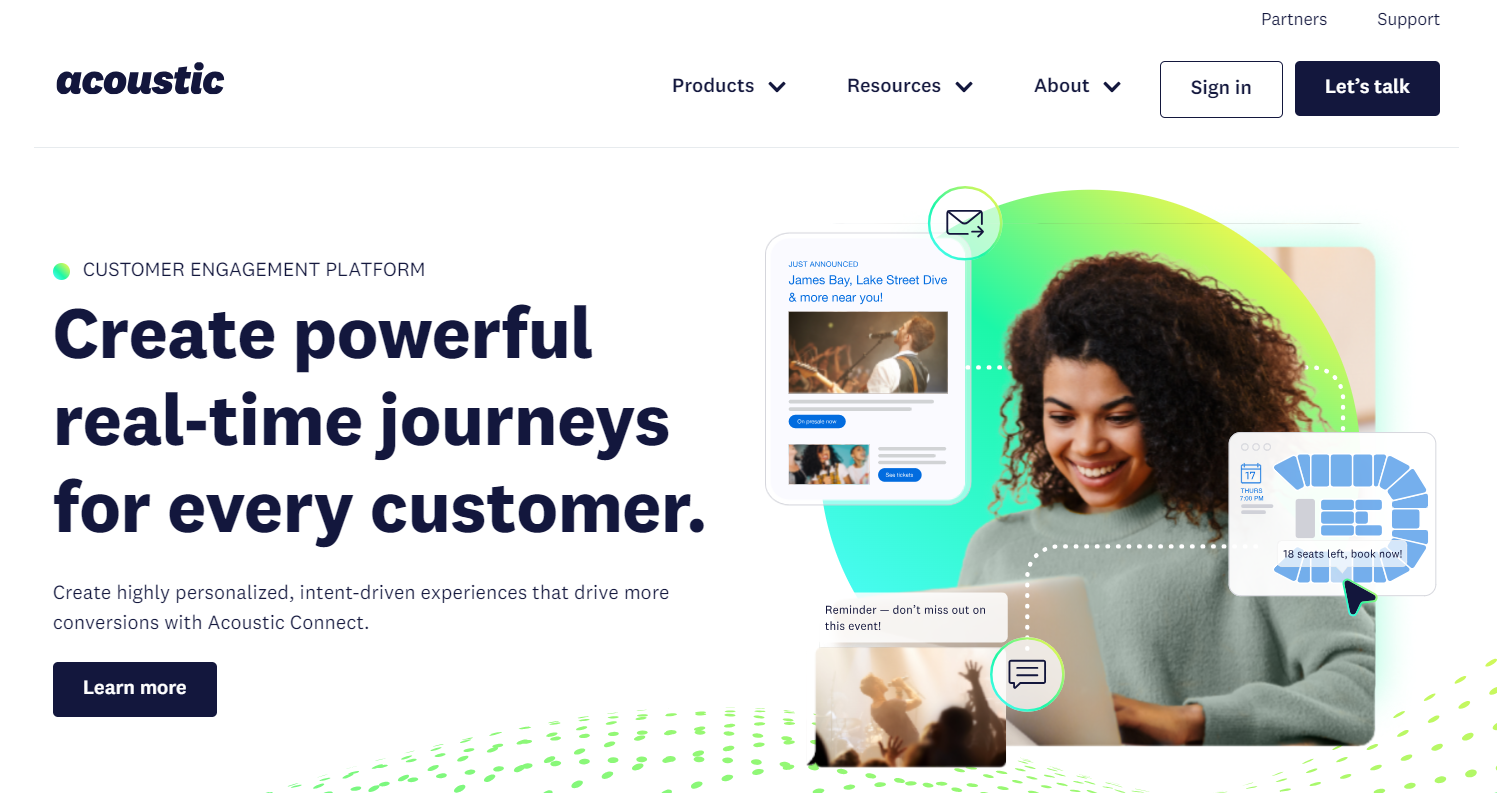
Clear and present benefits are seen. The power of AI in the retail sector lies in its ability to facilitate personalized, predictive, and localized shopping, strengthening customer relationships and loyalty.
AI in healthcare – Improving patient care
In healthcare, AI can streamline patient care and improve outcomes. It can predict patterns and anomalies in patient data, help with diagnosis, and even suggest treatment plans.
For instance, Google’s DeepMind Health is an AI software that can scan for early signs of age-related macular degeneration and diabetic retinopathy. Additionally, IBM Watson for Oncology identifies and ranks treatment plans based on a variety of factors, including clinical notes, external research, and patient history. It provides output in plain English, which helps.
AI doesn’t replace doctors but rather assists them, providing data-driven insights that can lead to early detection and improved treatment plans.
AI in finance – Streamlining operations and reducing risk
AI can revolutionize the financial sector by augmenting risk management and streamlining operations.
AI algorithms can detect unusual transactions that could indicate fraud. Mastercard has a bunch of AI-based features to help prevent and assess risk. Safety Net compiles data from widespread fraudulent activities. Then the company and the end-user can take steps to prevent similar occurrences. Cyber Secure also works to protect against data compromise and Mastercard Decision Intelligence checks thousands of different data points in real-time to ensure only the processing of genuine transactions.
AI Business Intelligence: Leveraging data for business growth
- A deeper grasp of AI Business Intelligence (BI)
- Discovering the numerous ways AI BI propels business growth and profitability
- Revealing the arsenal of AI BI tools and platforms
Understanding the concept of AI Business Intelligence
AI Business Intelligence is an array of tools and strategies that leverage artificial intelligence to convert raw data into meaningful and insightful business information. These strategies often use machine learning and NLP for tasks such as data mining, predictive analytics, and business reporting. The synergy of AI and BI elevates decision-making, ensuring your company stays ahead of the competition.

How AI Business Intelligence can drive growth and profitability
AI Business Intelligence (AIBI) is a tool of immense power and efficiency. For one, it enables quick identification of growth opportunities often hidden in cumbersome datasets. It offers predictive analytics functionality, thrusting your business into the future by delivering forecasts grounded in data, not guesswork. Let’s not forget its personalization capabilities, which can boost customer experience and directly impact profitability.
Add to that list the streamlining of business operations and the discovery of cost-saving opportunities through automated data analysis. It’s clear that AI BI isn’t just an upgrade, it can be a game-changer.
One prime example is Amazon’s AI-driven recommendation engine, contributing to almost 35% of the company’s total revenue.
Tools and platforms for AI Business Intelligence
“Every craftsman is only as good as his tools” rings true when engaging with AI Business Intelligence. There’s a growing suite of AI BI tools designed to match different industry needs and maturity levels.
Tableau, for example, simplifies data visualization and makes data analysis accessible for all business users. Then we have Power BI, Microsoft’s cloud-based business intelligence platform, designed to provide non-technical business users with tools for aggregating, analyzing, visualizing, and sharing data.
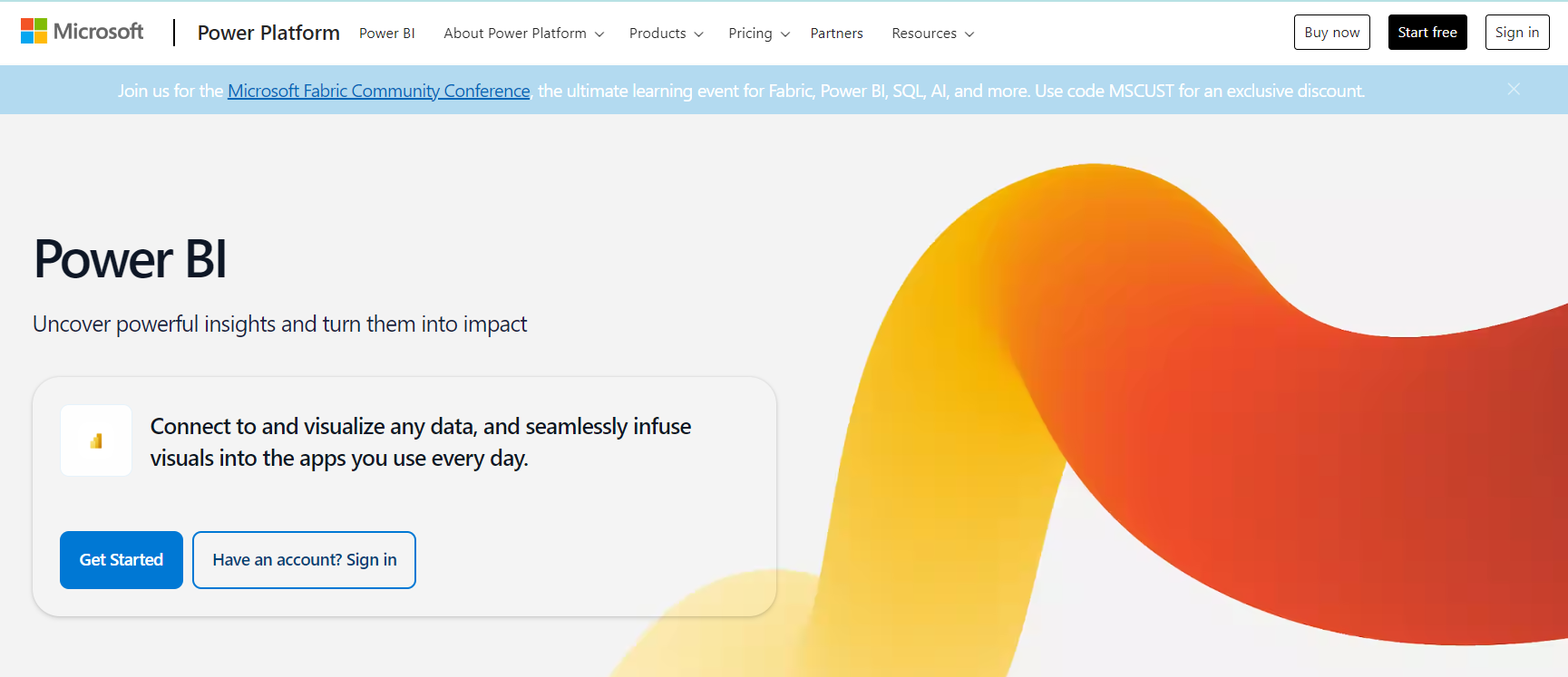
IBM’s Watson Analytics goes beyond the traditional data analysis tools by using AI to automate predictive analytics, data preparation, and data visualization.
The power to transform data into tangible growth is a power every business leader needs to harness. And with the right tools and strategies, you’re well on this path.
Final thoughts on powering your business with AI
The integration of AI into non-tech businesses isn’t as outlandish as it might seem. On the contrary, it offers enhanced efficiency, improved customer experience, and a competitive edge. This guide mapped out the crucial aspects of AI and ways to smoothly onboard it into your business operations.
Just envision the future of your company with AI in the driver’s seat. The potential is beyond increasing profit margins; it’s about embracing innovation, leading change, and building a resilient, future-ready enterprise.
So, are you poised to decode complexities, maximize your resources, and reinvent your business landscape? Don’t let a lack of tech knowledge deter you – arm yourself with an AI strategy and be ready to redefine your business.
Amy Lancelotte
TopApps writer
Recent Articles

Learn how to use advanced search tools, newsletters, and reviews to uncover the perfect AI-focused podcast for you.
Read More
Explore the top beginner-friendly AI podcasts. Our guide helps non-techies dive into AI with easy-to-understand, engaging content. AI expertise starts here!
Read More
Explore the features of The AI Podcast and other noteworthy recommendations to kick your AI learning journey up a notch. AI podcasts won’t...
Read More